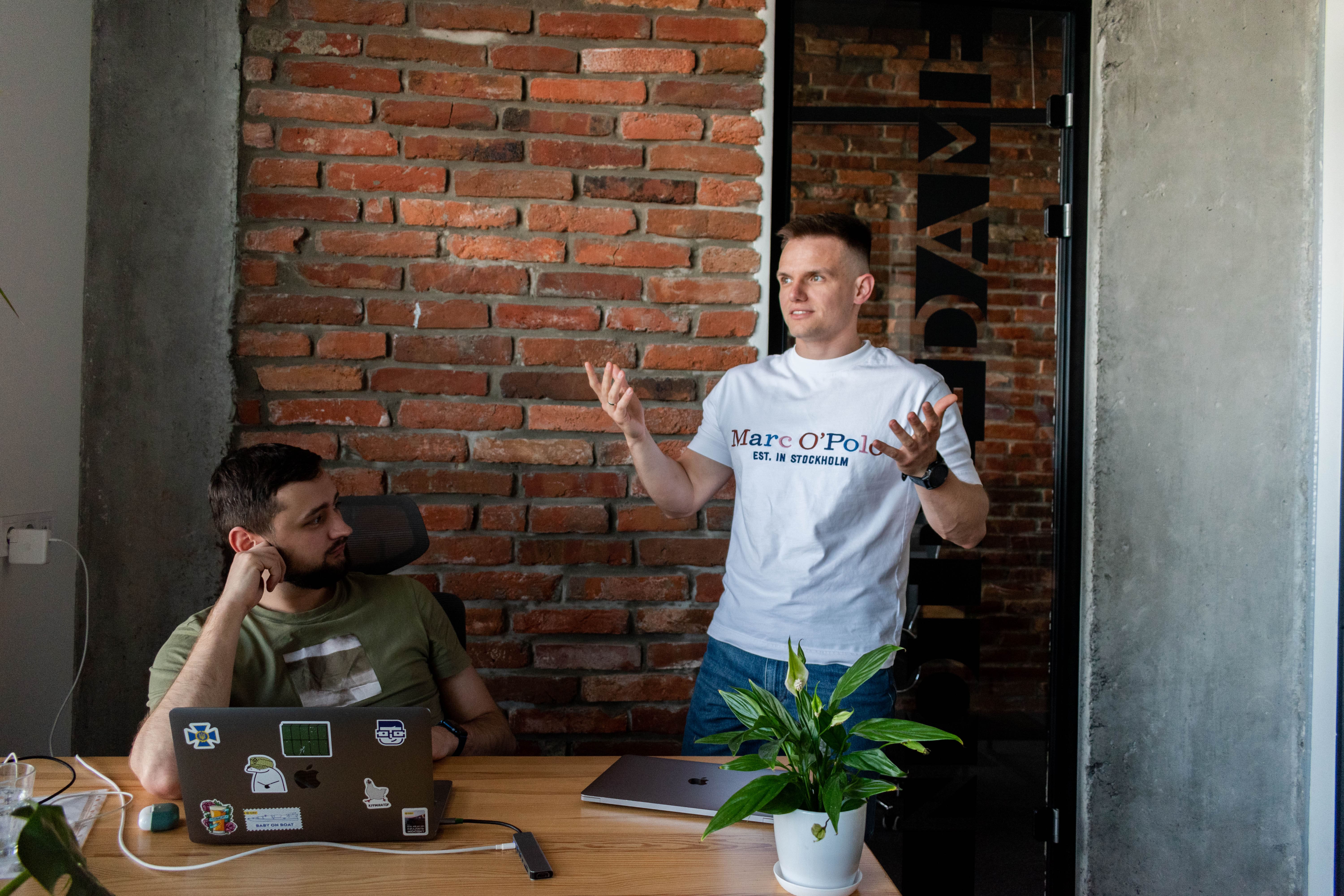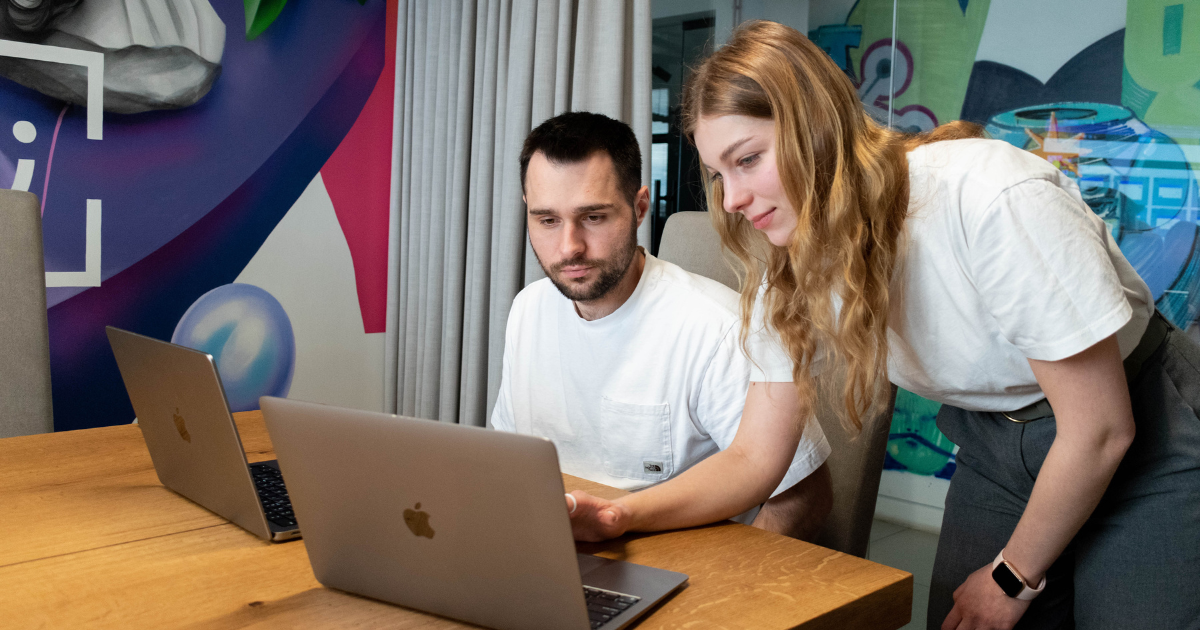От халепа... Ця сторінка ще не має українського перекладу, але ми вже над цим працюємо!

AI use cases in healthcare: Real apps with actual value

Volodymyr Vrublevskyi
/
Delivery Manager
9 min read
AI and healthcare seem like a perfect pairing. Healthcare is an industry that’s drowning in data (the main commodity of AI solutions), with overworked staff who could use some help from AI in hospitals and clinics and patients who are increasingly open to AI applications. It seems that lately, anyone can build an app with ChatGPT or with an open-source AI model. So why not use these large language models (LLMs) to build healthcare AI applications?
It’s easy to get carried away thinking about the possibilities. But let’s not forget that using AI in healthcare is still a sensitive topic because of the personal nature of the data needed to train AI algorithms. We believe that healthcare application development should only be done by professionals. And, as AI development professionals, we want to show you several types of AI development, popular use cases, and impressive examples that combine artificial intelligence and healthcare.
Article content:
AI software development: Training existing LLMs vs. custom LLM models and prompt engineering
Certainly, there are many ways of implementing AI in healthcare. But in this article, we’ve decided to focus on the most popular uses and show you the advantages and disadvantages of training existing artificial intelligence models vs. training custom artificial intelligence models and prompt engineering.
Training existing LLMs
Using a pre-trained model when building AI applications is a great way to save time and money. You don’t have to train an AI model if it’s pre-trained. Rather than start from scratch, you need only fine-tune it, which is much less expensive. Another advantage is that you don’t have to worry about building and maintaining your own infrastructure — you can rely on tried-and-true, community-tested methods.
The downside? You might face data privacy risks, and it’s hard to know exactly what data was used to train the model. While fine-tuning a model lets you adapt it to your needs, you don’t have as much control over the training as when you train your own AI model from scratch.

Training custom LLMs
Building your own custom large language model gives you full control over the data used for training, which means you can create models perfectly tailored to your needs. This often leads to better accuracy and performance, and you get the peace of mind that your model and data are private, which is immensely important for healthcare solutions.
However, developing and training a custom LLM is resource-intensive — it requires a lot of engineering talent and computational power, which can get expensive. Plus, finding the right specialists to design and maintain the infrastructure needed for artificial intelligence development and model training is usually a real challenge.
Read also: “Easier than you think”: NERDZ LAB’s CEO on developing AI apps
Prompt engineering
Prompt engineering is the simplest and quickest way to exploit artificial intelligence in healthcare. It requires minimal technical expertise, and you can acquire the necessary skills quickly. Prompt engineering doesn’t require any additional resources for model training or maintenance, which is an advantage when you develop an app with AI.
However, the trade-offs are significant: you have no control over the data used to train the model, which affects the quality and efficiency of the output. Data privacy is also beyond your control, and your system becomes entirely dependent on the availability of the service or platform that powers the LLM.
TLDR: Here’s a handy table of the pros and cons of popular approaches to artificial intelligence software development:
| Type of AI development | Pros | Cons |
| Training existing models |
|
|
| Training custom models |
|
|
| Prompt engineering |
|
|
But you’re not here to read the technical details about the ways of implementing AI solutions; you’re here to learn specifically about AI in healthcare, examples included.
Watch our CEO talking about AI software development on YouTube
Most popular use cases of AI technology in healthcare
Although you might not realize it, we all witnessed the impressive results of AI in healthcare when Moderna’s AI systems helped it prepare its first COVID-19 vaccine in a mere 42 days. There are many more AI applications in healthcare that help patients, doctors, caregivers, hospitals, clinics, and more, and they all vary in terms of how much investment they require in terms of technology, cost, and time. Here, we describe some use cases that can be quickly implemented on your own or with the help of a healthcare software development vendor without breaking the bank.
Models for diagnostic imaging
Computer-vision-based AI solutions help doctors read medical images like X-rays, MRIs, and CT scans. After training on massive datasets of images, AI can learn to spot tumors, fractures, and other issues, often catching details that radiologists might miss. AI helps reduce mistakes and reads images much faster than humans so that patients can get the correct diagnosis sooner. It’s especially helpful in locations where experienced radiologists are not readily available.

Models for personalized medicine
An AI app trained on a mix of genetic data, medical histories, and lifestyle information can help doctors customize treatments for patients. Compared to one-size-fits-all approaches, patients who get therapies tailored to their needs have better outcomes with fewer side effects. For instance, AI-powered apps can help predict how different patients will respond to various cancer therapies.
Models for predictive analytics
Some models trained on historical patient data can predict potential health issues before they become serious, like warnings for patients who are at high risk of heart attack or diabetic complications. By catching these issues early, an artificial intelligence app can alert healthcare providers so they can use preventive care to potentially save lives and reduce healthcare costs.
Artificial intelligence in hospitals also uses predictive analytics to help hospitals manage resources more efficiently by predicting patient admissions, staffing needs, and other operational requirements.
Prompt engineering for clinical decision support
AI-powered clinical decision support systems (CDSS) use prompt engineering to give healthcare professionals a helping hand. These systems analyze patient data and suggest diagnoses and treatment plans or flag potential drug interactions.
On top of that, AI can be used to generate prompts based on clinical data input from electronic health records (EHRs). These prompts can guide healthcare providers, reminding them about best practice guidelines and highlighting critical information that may affect patient care decisions.

Prompt engineering for symptom checkers
AI-based symptom checkers help patients figure out what might be going on before they see a doctor. Through prompt engineering, these AI tools ask patients relevant questions, process their answers, and then give patients a rough idea of what might be wrong or whether they should seek medical help. While they’re no substitute for a doctor, symptom checkers are great for giving people a bit of peace of mind and helping them decide on their next steps. By triaging patient concerns, these systems help manage healthcare resources effectively.
Prompt engineering for virtual health assistants
Virtual health assistants use natural language processing (NLP) to engage in conversations with patients, helping them with everyday tasks like reminding them to take medications, answering health questions, and giving advice on managing conditions. Virtual health assistants can chat with patients about what’s bothering them, keep track of symptoms, and even alert doctors if something seems off.
Virtual health assistants are especially great for people with chronic conditions. They provide continuous support and free up healthcare providers to focus on more complex cases.

Exciting examples of AI in healthcare
It’s amazing how artificial intelligence solutions push healthcare toward new discoveries and opportunities. And we’re not just talking about managing large EHR systems and remote scheduling of doctor appointments. We mean helping people make sense of prescriptions, monitoring mental health in the workplace, improving women’s reproductive health issues, and more. Here are just five startups that demonstrate the impressive benefits of AI when it’s applied to help people mitigate various conditions.

Vulgaroo
Vulgaroo uses AI to make medical reports easier for everyone to understand. Their AI technology uses neural networks to translate complex scientific texts into simple language. It then assesses the quality and readability of the output to ensure that those without scientific knowledge can understand it. This simplification helps patients better understand their conditions, which can reduce anxiety and make consent to treatment plans go more smoothly. For doctors, it provides a clearer basis for discussing results with patients, speeds up explanations of complex conditions, and improves their patients’ medication adherence. Health facilities benefit from an automated tool that generates simplified reports and integrates seamlessly into existing IT systems. Learn more about this project here.
Bewellcome
Bewellcome is an AI solution that mitigates mental health issues such as stress and burnout in the workplace. Its AI uses real-time monitoring for early detection of potential challenges faced by staff and offers personalized support through an intelligent chatbot and expert consultations. The AI helps enhance overall well-being by providing a confidential space for employees and delivering anonymized insights to their employers.
Bewellcome uses data security with GDPR compliance and ISO 27001-certified servers in France to ensure privacy. Learn more.
Caona
Caona is an AI app designed to help women better understand and manage their hormonal health. It tracks and analyzes menstrual cycles, PMS, and menopausal symptoms, offering personalized insights based on scientific research. The app uses AI to provide predictive guidance tailored to each user’s unique hormonal patterns. Privacy is a key focus, with all data securely managed and controlled by the user. Caona also facilitates communication with healthcare professionals who can support women in navigating their hormonal health journey.

Anapix
ANAPIX Medical was established with the goal of making advanced skin cancer detection available to everyone. To this end, they created SkinApp, an ISO 13485:2016 certified tool that helps doctors easily detect and screen for skin cancer. It comes with a smartphone, a dermoscope, and an adapter.
The AI-powered app not only captures and tracks images of skin lesions but also sends them in real time to a secure system. There’s also a web application that lets users manage and analyze images, add health information, use AI for dermoscopic analysis, and even get a dermatologist’s expert opinion for a detailed medical report. Learn more.
AALIATALK
AALIATALK is another interesting application of AI in healthcare. It’s an AI voice assistant that helps doctors and patients who speak different languages communicate more effectively during medical visits. It reduces the risk of misunderstandings, saves time in consultations, and helps cut down on unnecessary tests and hospital visits. Available 24/7, AALIATALK works in real time, keeping conversations private and secure without the need for a third-party interpreter.
AALIATALK interprets language more accurately than regular translation tools because it understands medical and cultural contexts. Doctors can see a real-time transcript of the conversation, ensuring they know exactly what the patient intends to communicate.
Built with GDPR compliance, AALIATALK also ensures that patient data stays protected. 
And one more app from NERDZ LAB
To us, the broad term healthcare also means taking care of yourself, body, and mind. So, NERDZ LAB developed a fitness and SaaS well-being platform for one of our clients. The app’s standout feature is its AI Coach, which creates personalized training programs based on user activity. By analyzing data from training videos, mental health checks, and physical activity tracked through connected devices, the AI Coach tailors workout plans with activities for exercising at home, at the gym, or outdoors.
With a database of around 2,500 exercises, the AI Coach continuously adapts programs based on user feedback, ensuring a customized and evolving fitness experience. Additionally, the platform has social features; users can post about their workouts and their progress, and global leaderboards keep users motivated on their fitness journey.
Conclusion
The use of AI in healthcare has opened up exciting possibilities. It makes delivering personalized, efficient, and accessible care easier than ever. Whether you’re considering building a custom artificial intelligence solution from scratch or using existing models, there are so many ways AI can make a meaningful difference in healthcare — from reading medical images more efficiently to virtual assistants that support patients on a daily basis.
If you’re curious about how AI could benefit your healthcare facilities, NERDZ LAB is here to consult or estimate project costs. So contact us if you want to build an AI app that brings real value to your users and your business.




